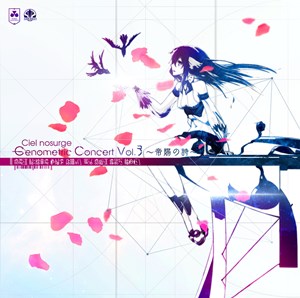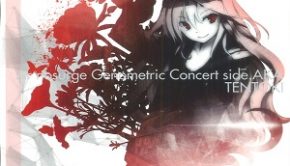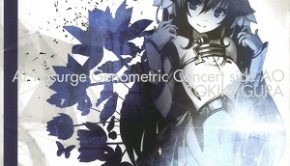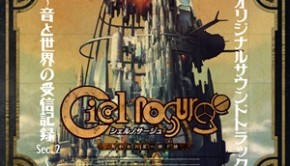Surge Concerto: Ciel nosurge Genometric Concert Vol. 3 -Imperial Songs-
 |
Album Title: Ciel nosurge Genometric Concert Vol. 3 -Imperial Songs- |
| Record Label: Gust |
|
| Catalog No.: KECH-8003 |
|
| Release Date: October 1, 2014 |
|
| Purchase: Buy at CDJapan |
Overview
After a two year-long run, Gust’s visual novel/communication sim game hybrid Ciel nosurge has finally come to an end. And shortly after the final chapter was released in Japan, Gust released the game’s two final albums, one of them being a vocal album containing the four songs featured in its final chapters. This time around, Akiko Shikata returns to the stage, joined by fripSIDE Singer Yoshino Nanjo and the well-known Yoko Ueno. However, does this album live up to the expectations it has for the ending of the game and to the standard set by its predecessors? Or have the songs on it finally lost the magic they were supposed to have?
Body
First, I’d advise having listened to the previous two volumes and having read their respective reviews in order to have context for this album. This is because, as mentioned previously, this album covers the songs sung in the final four chapters of Ciel nosurge, which are known as the Empress Arc.
Now then, we begin with the first of its four songs, “Duo Waltz of the Rainbow Country”, which is the centerpiece for Ciel nosurge’s ninth chapter, as well as being the longest song in the album, clocking at 5:19 in length. This piece is sung by Yoshino Nanjo and composed by Hiroyuki Oshima, and it’s a bit hard to describe due to its unusual sound, but I guess I could classify it as a mix of folk and circus music, with instrumentation focused on strings, drums, violin, and accordion. It generally has a cheery and steady rhythm, as well as having an overall sugary feeling to its lyrics and melody. I also enjoy the violin solo near the end. However, it does still feel lacking in comparison to the previous songs featured in the game.
However, this is easily explained by it being the very first Song Magic the character behind it has ever made: a young girl called Casty Riernoit, her nickname being Cass. She and her other friends had been taken apart from Ion and Nay during the events of chapter 6, and had been sent to the most popular amusement park in Ra Ciela: Palace Nyurokeel. However, this place was actually a brainwashing facility for those that opposed the Astronomical Faction, so they had been brought there due to being considered dangerous elements. They met Nero in that place, and upon seeing how Nero was being threatened by the Astronomical Faction agents, Casty crafted this song with the help of her friend Sarly in order to save Nero and escape the amusement park. With this, it’s pretty easy to see the song has this particular childish sound due to being sung by a child that embraces strong ideals and feelings about wanting to save a friend.
Next, we come to Akiko Shikata’s return to the vocal music part of Ciel nosurge after being absent from the previous seven chapters. She offers a beautiful song called “mei-fa-re koo-ja-i;”, which translates to “Existing at Your Side” from Emotional Song Pact, which serves as the closing act for the tenth chapter. Lasting over four minutes, this song begins with a beautiful choral intro before focusing on a mournful solo voice. The song eventually crescendos with violin and ocarina, before repeating the mournful section once more, until a key change comes in to shift it into a cheerier section, until it falls silent completely. It then becomes greatly energetic, like a rallying call, and continues like this until it calms down once again. After a short bridge formed by the ocarina and violin, this structure then repeats all over with a few variations, except for the more energetic chorus near the end having a key change and a great increase in energy right as the final group of choruses is being sung. I have to say this song is nothing short of excellent, and its depiction of sadness and despair changing into trust and happiness is quite moving. I must also say that it reminds a lot of some of the songs Akiko Shikata has made in the past for her own independent albums: the intro is reminiscent of her song “Replicare”, while the most energetic parts are very similar in overall atmosphere to her duet of story songs “Under a Sunny Sky” and “Of the First Rainfall at the End of the Prayers”.
As it should be expected, Ion is the singer for this song in Ciel nosurge’s story, and she used it to save Ra Ciela from a great disaster called a Cielnotron Panic, which would cause all Cielnotrons in the planet to stop working at once. After Nero was taken out from the Cielnotron Server by Zill in chapter 7, the Astronomical Faction began using a secondary server powered by artificial Genoms called Sharls so the Cielnotrons wouldn’t stop working, but said server began failing because the Chairman of the Astronomical Faction, Revelt, threw himself into the tank containing the Sharls while holding a medicine that would annihilate them after he was overthrown by Renall, which caused the Sharls to feel terror at the idea of dying and made them go berserk, causing the Cielnotrons all around Ra Ciela to go haywire.
Upon seeing this, Ion decided to use her Overlooking Viewpoint alongside a Song Magic crafted along her Genom, Terefunken, to stop the Cielnotron Panic. However, Terefunken couldn’t provide her with the necessary energy for this, so her friends Nay and Kanon asked the populace to chain their feelings with her to give them the power they needed for the song. However, Terefunken couldn’t handle all that energy, and when he was about to be overwhelmed by it, the Genom king Cosal scolded him for being so weak, and told him that if he actually cared about Ion, he should do everything he can to help her. This made Terefunken’s feelings to fully synchronize with Ion’s, and they both reached a synchronization stage in which both their bodies merged together, turning Ion into a half-dragon girl that had the energy necessary to carry out the song and stop the Cielnotron Panic. That the song has that sad sound at the beginning is because Ion pities the Sharls and considers them living beings, as the song’s core purpose is to calm down the berserk Sharls; and also due to her singing it while reminiscing about the times she spent with Terefunken. On the other hand, the change in rhythm and mood coincides with her fusion with Terefunken, which is when the song actually begins having effect.
Next, we come to the penultimate song in the game, “Ritual Prayer Dedicated to the Succession Ceremony”, which is composed and sung by Yoko Ueno. Having a length over four minutes and half, it starts with a group of bells to then give way to a traditional Japanese-style chorus, making the listener feel as if they were being surrounded by the voices. After the rest of the exotic instrumentation (erhu, koto, hackbrett, flugelhorn and euphonium) kicks in, Ueno begins singing in a majestic and grandiose tone, accompanied by electronic percussion. After a short interruption by the chorus, the song begins building up and finishes in an elegant and regal climax. Then it enters a bridge formed by the percussion, erhu and choruses before repeating the buildup section, leading it into the ending with a couple of choruses and bells. Even without knowing the lyrics, it’s possible to feel a strong sense of royalty, devotion and sanctity to this entire song, which is explained due to its nature as a ritual song.
Aside from being the centerpiece of Ciel nosurge’s eleventh chapter, this song has been used ever since the Empire that rules over Ra Ciela was established about 5000 years prior to the start of the game. It’s used in order to pass on the title of Empress to the Princess that was chosen as the most capable after the three years of Trials, as the singer becomes a vessel for the Wills of Planet Ra Ciela in order for them to judge the prospective Empress to see if she is worthy of receiving the title. Since Kanon perished in the events of this chapter and only Ion remained, she was crowned Empress by default, and her friend Renall was in charge of singing this song as Ion and the former Empress conducted the succession ritual, and aside of bestowing upon her the crown, she also gave her the Voice of the Empress: special vocal chords that would allow their bearer to sing Song Magic of an incomparable power.
And with this, we come upon the final song in the game, and in the album: “Ra Ciel Fuser”, which is co-composed by Akira Tsuchiya and Akiko Shikata, and arranged by Shikata herself. It begins with some percussion and electronic sounds, and then Shikata kicks off the song proper by singing a powerful chorus in REON-4213 accompanied by an electric guitar and strings. After a bit of accompaniment from the trumpet and horn, the song calms down a bit as Shikata sings in a contemplative, yet sorrowful tone. The song gains energy once again a bit later, with the strings and Shikata’s voice also giving off a strong feeling of despair, but then goes soft again as a great sadness is felt from them both. Then, it becomes energetic once again as it becomes a reprise of the second half of the opening to Ar nosurge: “To the Songless Hill –Harmonics Pre=Ciel-”, though feeling somewhat grander due to the addition of the brass instruments and the strings group. Once this section ends, the song gives way to an instrumental bridge formed by the brass, strings, and a chorus chanting the initial lyric lines to Ciel nosurge’s own opening: “To the Songless Hill”, and a short piano solo. It then repeats everything after the initial chorus, but with a less energetic and a far more hopeful tone, and it ends in a beautiful harmony between the percussions, brass and strings. While it has a sad and desperate sound at parts, it also shows a great hope and will to live.
To put it simply, Ra Ciel Fuser is the song that serves to carry out the Grand Phoenix Project that the Astronomical Faction advocated, and at the point in which hit was sung, there was no other option: Ra Ciela’s core had been gouged due to Revelt’s actions in chapter 11, and the planet itself had begun to fall apart, so after evacuating all the people that didn’t want to remain on the dying planet to the Singing Hill space station, Ion stood over the platform where she was supposed to sing. She gave her farewells to Ra Ciela while promising to take care of the people that once inhabited it, and she began singing this song. Instantly, the Spherial Rings: the large structures surrounding the planet that were created for this song, began spinning, and caused Ra Ciela to shatter into millions of pieces, which were all then compressed into a miniature quasar containing all of its mass converted into energy. This also spelt death for the people and Genoms that decided to remain on it and perish alongside their world. However, that energy was then used to open up a rip in time-space that led the people in the Singing Hill to a new inhabitable planet, making them cheer for their Empress due to having saved them, and Ion broke down in tears upon finishing the song regretting immensely what she had to do, but still thanking Ra Ciela from the bottom of her heart for giving them a last chance to continue living.
Given all this, it’s easy to see why the song sounds the way it does, and why it might seem lacking in grandness in comparison to the previous ending themes in the series: Ion herself doesn’t want to sing it, but knows she has no other way to save the people at this point. The parts that sound filled with despair are synchronized in the game with the video showing Ra Ciela shattering, while the sad and soft one right after show its compression into the Micro Quasar, and the final part; the one that quotes the Ar nosurge opening, is the one that shows the rip in space opening and making the new planet “appear” before the people, showing the hopeful future that awaits for them; as well as also tying the game with its sequel. Also, the reappearance of the choruses from Ciel nosurge’s own opening theme make this like a final look back on the entire journey the player had with Ion: supporting her and helping her regain her memories, and seeing her mature from the scary and shy girl at the very beginning of the succession trials into the Empress that led her people to a new world. Even though this isn’t actually the point where the game ends, and there’s more stories to tell about it… but that is something that goes beyond the scope of this review.
Summary
While Akiko Shikata’s return to the forefront and Yoko Ueno’s contribution to the album make it a good listen, unfortunately I find that Yoshino Nanjo’s song isn’t as good as it should have been. I therefore find this album is overall a bit weaker than the second volume: not only does it have four songs, making it dubious value for money at 2000 JPY, but also due to one of these four tracks being rather lacking in general. The DVD that was bundled with it is also rather disappointing: while it contains videos of the in-game scenes in which the songs were used, it also contains two that were already contained in the second volume: “QuelI->EX[cez]->{kranz};” and “zu-fao jen-din;”, as well as having once again the same promotional videos from it. I also have to add that it’s pretty sad that we didn’t get a re-release of the chapter ending theme “Ra Ciel” or an official release for the Beta version of the Ar nosurge song “Class::EXSPHERE_NOSURGE;”.
Therefore, my final call on it would be the same as the previous Genometric Concert volumes: most of the songs on it are good listens on their own and can compare to the music made previously for the games in the EXA_PICO universe, yet it will be more enjoyable to those that have witnessed the build-up to them and the scenes they were used in-game. So while I’d recommend at least listening to it, it’d be preferable to have already gained a taste for the music in the series, as it’s slightly pricier than its predecessors while having less material overall.
Do you agree with the review and score? Let us know in the comments below!
3
Posted on August 17, 2015 by Gerardo Iuliani. Last modified on January 19, 2016.















It a bit harsh to give it only 3 stars. `Ra Ciel Fusor` and `Duo Waltz of the Rainbow Country` are some of the best songs I listened to
I think the score is fair. Issue is that, while at least two of the songs are great, the album only features four songs in total (including one disappointment). This might have been acceptable if it’s priced like a single, but at 2000 JPY, I’m not convinced it’s worth the pricetag. Keep in mind the entire three-disc soundtrack for Ar nosurge is 3500 JPY.